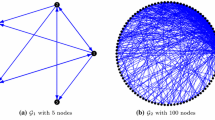Abstract
In this paper, we investigate the problems of robust semiglobal coordination of coupled harmonic oscillator systems with input saturation together with dead zone and input additive disturbances, in which the coupled harmonic oscillators can serve as an approximation of modern complex systems in the field of system engineering, such as SoS (system of systems). By virtue of the parameterized low-and-high-gain feedback technique, sufficient conditions are provided to guarantee the robust semiglobal coordination of coupled harmonic oscillator systems with input saturation together with decentralized state-dependent input additive disturbances and distributed state-dependent input additive disturbances. Finally, numerical examples are proposed to verify all the theoretical results.









Similar content being viewed by others
References
X. Chen, M. Shi, H. Sun, Y. Li, H. He, Distributed cooperative control and stability analysis of multiple DC electric springs in a DC microgrid. IEEE Trans. Ind. Electron. 65(7), 5611–5622 (2018)
X. Chen, Y. Hou, S.Y.R. Hui, Distributed control of multiple electric springs for voltage control in microgrid. IEEE Trans. Smart Grid 8(3), 1350–1359 (2017)
M.Z.Q. Chen, L. Zhang, H. Su, G. Chen, Stabilizing solution and parameter dependence of modified algebraic riccati equation with application to discrete-time network synchronization. IEEE Trans. Automat. Control 61(1), 228–233 (2016)
Y. Jiang, J. Liu, S. Wang, Consensus tracking algorithm via observer-based distributed output feedback for multi-agent systems under switching topology. Circuits Syst. Signal Process. 33(10), 3037–3052 (2014)
Y. Lu, L. Zhang, X. Mao, Distributed information consensus filters for simultaneous input and state estimation. Circuits Syst. Signal Process. 32(2), 877–888 (2013)
Y. Liu, J. Slotine, A. Barabsi, Controllability of complex networks. Nature 473(7346), 167–73 (2011)
A. Okubo, Dynamical aspects of animal grouping: swarms, schools, flocks, and herds. Adv. Biophys. 22(22), 1–94 (1986)
R. Olfati-Saber, R.M. Murray, Consensus problems in networks of agents with switching topology and time-delays. IEEE Trans. Autom. Control 49(9), 1520–1533 (2004)
R. Olfati-Saber, Flocking for multi-agent dynamic systems: algorithms and theory. IEEE Trans. Autom. Control 51(3), 401–420 (2006)
H. Pan, W. Sun, H. Gao, J. Yu, Finite-time stabilization for vehicle active suspension systems with hard constraints. IEEE Trans. Intell. Transp. Syst. 16(5), 2663–2672 (2015)
H. Pan, W. Sun, H. Gao, X. Jing, Disturbance observer-based adaptive tracking control with actuator saturation and its application. IEEE Trans. Autom. Sci. Eng. 13(2), 868–875 (2016)
H. Pan, X. Jing, W. Sun, H. Gao, A bioinspired dynamics-based adaptive tracking control for nonlinear suspension systems IEEE Trans. Control Syst. Technol. (26)3, 903–914 (2018)
H. Su, H. Wu, X. Chen, M.Z.Q. Chen, Positive edge consensus of complex networks. IEEE Trans. Syst. Man Cybern. Syst. (2017) https://doi.org/10.1109/TSMC.2017.2765678
H. Su, H. Wu, X. Chen, Observer-based discrete-time nonnegative edge synchronization of networked systems. IEEE Trans. Neural Netw. Learn. Syst. 28(10), 2446–2455 (2017)
H. Su, M.Z.Q. Chen, J. Lam, Z. Lin, Semi-global leader-following consensus of linear multi-agent systems with input saturation via low gain feedback. IEEE Trans. Circuits I 60(7), 1881–1889 (2013)
Q. Song, F. Liu, H. Su, A.V. Vasilakos, Semi-global and global containment control of multiagent systems with second-order dynamics and input saturation. Int. J. Robust Nonlinear 26(16), 3460–3480 (2016)
H. Su, Y. Qiu, L. Wang, Semi-global output consensus of discrete-time multi-agent systems with input saturation and external disturbances. ISA Trans. 67, 131–139 (2017)
H. Su, M.Z.Q. Chen, X. Wang, J. Lam, Semiglobal observer-based leader-following consensus with input saturation. IEEE Trans. Ind. Electron. 61(6), 2842–2850 (2014)
H. Su, M.Z.Q. Chen, G. Chen, Robust semi-global coordinated tracking of linear multiagent systems with input saturation. Int. J. Robust Nonlinear 25(14), 2375–2390 (2015)
J. Toner, Y. Tu, Hydrodynamics and phases of flocks. Ann. Phys. 318(1), 170–244 (2005)
X. Wang, H. Su, X. Wang, B. Liu, Second-order consensus of multi-agent systems via periodically intermittent pinning control. Circuits Syst. Signal Process. 35(7), 2413–2431 (2016)
X. Wang, X. Wang, H. Su, G. Chen, Fully distributed event-triggered consensus of multi-agent systems with input saturation. IEEE Trans. Ind. Electron. 64(6), 5055–5064 (2017)
H. Wu, H. Su, Discrete-time positive edge-consensus for undirected and directed nodal networks. IEEE Trans. Circuits Syst. II: Express Briefs 65(2), 221–225 (2018)
X. Wang, X. Wang, Semi-global consensus of multi-agent systems with intermittent communications and low-gain feedback. IET Control Theory A 9(5), 766–774 (2015)
X.L. Wang, H. Su, M.Z.Q. Chen, X.F. Wang, Observer-based robust coordinated control of multiagent systems with input saturation. IEEE Trans. Neural Netw. Learn. 29(5), 1933–1946 (2018)
X.L. Wang, H. Su, X.F. Wang, G. Chen, Robust semiglobal swarm tracking of coupled harmonic oscillators with input saturation and external disturbance. Int. J. Robust Nonlinear 28, 1566–1582 (2018)
Z. Zhao, Z. Lin, Semi-global leader-following consensus of multiple linear systems with position and rate limited actuators. Int. J. Robust Nonlinear 25(13), 2083–2100 (2016)
B. Zhou, X. Liao, T. Huang, H. Li, G. Chen, Event-based semiglobal consensus of homogenous linear multi-agent systems subject to input saturation. Asian J. Control 19(2), 564–574 (2017)
Z. Zhang, Z. Zuo, Y. Wang, Finite-time consensus of neutrally stable multi-agent systems in the presence of input saturation. J. Franklin Inst. (2017)https://doi.org/10.1016/j.jfranklin.2017.12.013
Acknowledgements
This work was supported by the National Natural Science Foundation of China under Grant No. 61403255 and the National Defense Science foundation project of China under Grant No. JCKY 2017207B005.
Author information
Authors and Affiliations
Corresponding author
Rights and permissions
About this article
Cite this article
Ni, F., Sun, Y., Yu, M. et al. Robust Semiglobal Coordination of Coupled Harmonic Oscillator Systems Subject to Input Saturation. Circuits Syst Signal Process 38, 1982–1999 (2019). https://doi.org/10.1007/s00034-018-0949-7
Received:
Revised:
Accepted:
Published:
Issue Date:
DOI: https://doi.org/10.1007/s00034-018-0949-7




